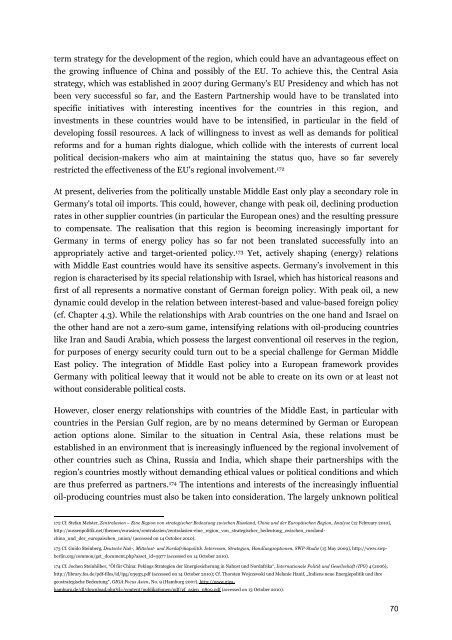PEAK OIL
PEAK OIL
PEAK OIL
Create successful ePaper yourself
Turn your PDF publications into a flip-book with our unique Google optimized e-Paper software.
term strategy for the development of the region, which could have an advantageous effect on<br />
the growing influence of China and possibly of the EU. To achieve this, the Central Asia<br />
strategy, which was established in 2007 during Germany's EU Presidency and which has not<br />
been very successful so far, and the Eastern Partnership would have to be translated into<br />
specific initiatives with interesting incentives for the countries in this region, and<br />
investments in these countries would have to be intensified, in particular in the field of<br />
developing fossil resources. A lack of willingness to invest as well as demands for political<br />
reforms and for a human rights dialogue, which collide with the interests of current local<br />
political decision-makers who aim at maintaining the status quo, have so far severely<br />
restricted the effectiveness of the EU's regional involvement. 172<br />
At present, deliveries from the politically unstable Middle East only play a secondary role in<br />
Germany's total oil imports. This could, however, change with peak oil, declining production<br />
rates in other supplier countries (in particular the European ones) and the resulting pressure<br />
to compensate. The realisation that this region is becoming increasingly important for<br />
Germany in terms of energy policy has so far not been translated successfully into an<br />
appropriately active and target-oriented policy. 173 Yet, actively shaping (energy) relations<br />
with Middle East countries would have its sensitive aspects. Germany’s involvement in this<br />
region is characterised by its special relationship with Israel, which has historical reasons and<br />
first of all represents a normative constant of German foreign policy. With peak oil, a new<br />
dynamic could develop in the relation between interest-based and value-based foreign policy<br />
(cf. Chapter 4.3). While the relationships with Arab countries on the one hand and Israel on<br />
the other hand are not a zero-sum game, intensifying relations with oil-producing countries<br />
like Iran and Saudi Arabia, which possess the largest conventional oil reserves in the region,<br />
for purposes of energy security could turn out to be a special challenge for German Middle<br />
East policy. The integration of Middle East policy into a European framework provides<br />
Germany with political leeway that it would not be able to create on its own or at least not<br />
without considerable political costs.<br />
However, closer energy relationships with countries of the Middle East, in particular with<br />
countries in the Persian Gulf region, are by no means determined by German or European<br />
action options alone. Similar to the situation in Central Asia, these relations must be<br />
established in an environment that is increasingly influenced by the regional involvement of<br />
other countries such as China, Russia and India, which shape their partnerships with the<br />
region’s countries mostly without demanding ethical values or political conditions and which<br />
are thus preferred as partners. 174 The intentions and interests of the increasingly influential<br />
oil-producing countries must also be taken into consideration. The largely unknown political<br />
172 Cf. Stefan Meister, Zentralasien – Eine Region von strategischer Bedeutung zwischen Russland, China und der Europäischen Region, Analyse (12 February 2010),<br />
http://aussenpolitik.net/themen/eurasien/zentralasien/zentralasien-eine_region_von_strategischer_bedeutung_zwischen_russlandchina_und_der_europaischen_union/<br />
(accessed on 14 October 2010).<br />
173 Cf. Guido Steinberg, Deutsche Nah-, Mittelost- und Nordafrikapolitik. Interessen, Strategien, Handlungsoptionen, SWP-Studie (15 May 2009), http://www.swpberlin.org/common/get_document.php?asset_id=5977<br />
(accessed on 14 October 2010).<br />
174 Cf. Jochen Steinhilber, “Öl für China: Pekings Strategien der Energiesicherung in Nahost und Nordafrika“, Internationale Politik und Gesellschaft (IPG) 4 (2006),<br />
http://library.fes.de/pdf-files/id/ipg/03933.pdf (accessed on 14 October 2010); Cf. Thorsten Wojczewski und Melanie Hanif, „Indiens neue Energiepolitik und ihre<br />
geostrategische Bedeutung“, GIGA Focus Asien, No. 9 (Hamburg 2007), http://www.giga-<br />
hamburg.de/dl/download.php?d=/content/publikationen/pdf/gf_asien_0809.pdf (accessed on 13 October 2010).<br />
70


